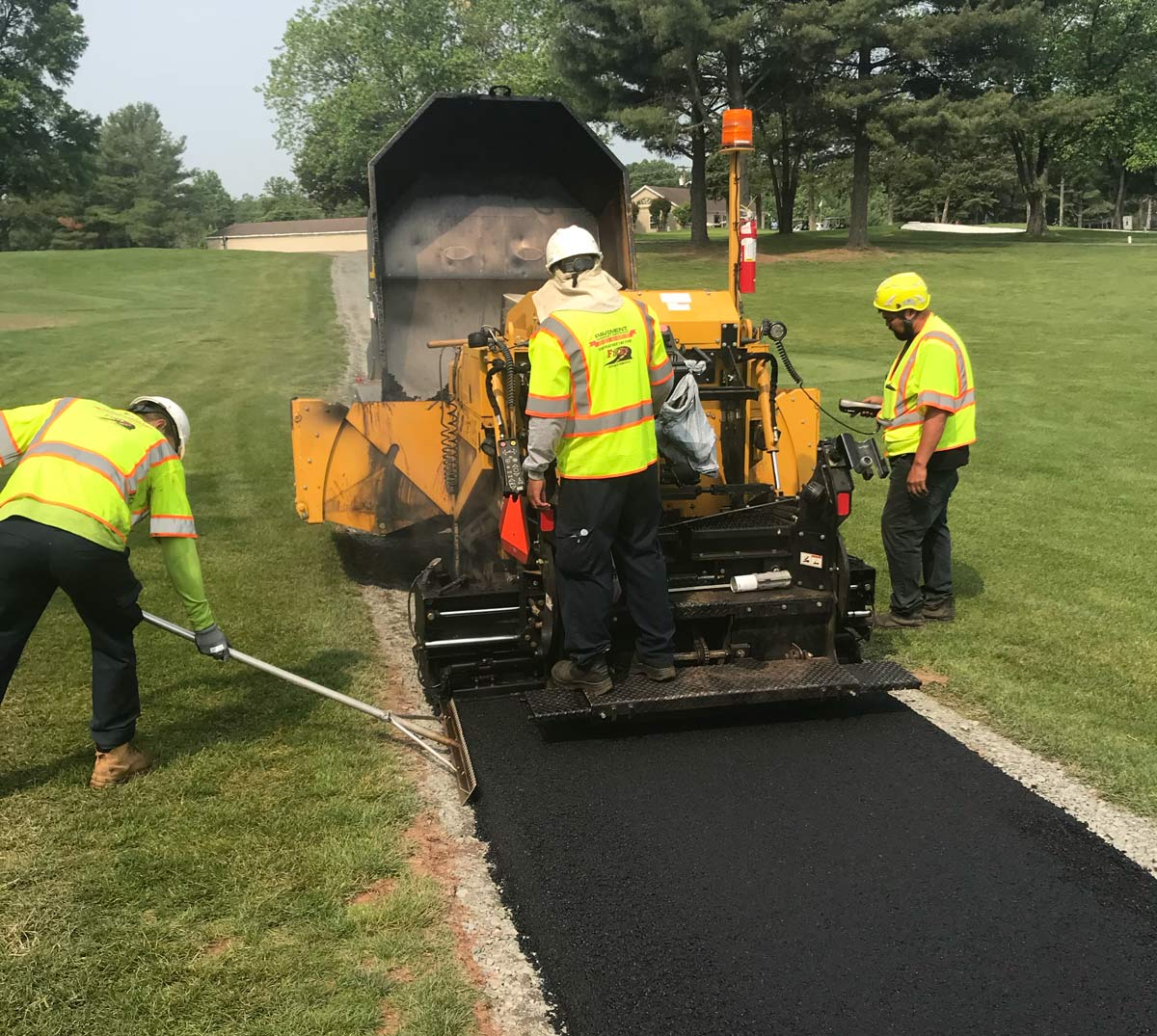Exploring the Different Types of Asphalt Paving and Their Advantages
The landscape of asphalt paving encompasses a range of types, each engineered to resolve particular needs and environmental factors to consider. From the durable qualities of Warm Mix Asphalt to the environmentally friendly features of Recycled Asphalt Pavement, comprehending these alternatives can considerably affect project results. Advancements such as Cozy Mix Asphalt and Porous Asphalt introduce additional layers of effectiveness and sustainability. As we discover these various paving solutions, the nuanced advantages they use might surprise you and potentially change your technique to future paving tasks.
Hot Mix Asphalt
When considering the most effective paving solutions, hot mix asphalt (HMA) stands apart as a premier choice for numerous applications (paving). HMA is a versatile paving material known for its durability, adaptability, and general performance. It is produced by heating asphalt binder and incorporating it with aggregates at heats, ensuring a consistent combination that can hold up against numerous ecological conditions
One of the primary benefits of HMA is its capacity to supply a smooth, skid-resistant surface, enhancing safety for vehicles and pedestrians alike. In addition, HMA displays outstanding resistance to deformation, making it perfect for high-traffic locations such as freeways and parking area. Its adaptability to various climates even more adds to its prevalent use.
The installation procedure of HMA is fairly fast, permitting efficient task conclusion with minimal disturbance to web traffic. Furthermore, it can be reused, minimizing waste and promoting sustainability within the building and construction market. In general, warm mix asphalt stays a leading option for leading experts as a result of its robust efficiency qualities and lasting cost-effectiveness, making it a reputable solution for different framework requirements
Cozy Mix Asphalt
Warm mix asphalt (WMA) uses an innovative option to warm mix asphalt, offering comparable advantages while needing reduced manufacturing temperatures. Commonly produced at temperature levels in between 190 ° F and 250 ° F, WMA technology minimizes power consumption and greenhouse gas discharges throughout production, making it a more eco-friendly option.
This versatility can lead to enhanced compaction and general longevity of the asphalt surface area. In addition, WMA can be used in various applications, ranging from highways to residential driveways, without compromising performance.

The unification of ingredients or customized binders in WMA adds to its improved homes, making sure that it satisfies or exceeds performance criteria. In addition, WMA's minimized thermal effect during manufacturing can lower the probability of damage to the surrounding environment, making it an enticing selection for sustainable paving practices.
Cold Mix Asphalt
Cold mix asphalt is a functional paving option commonly utilized for short-lived repair work and low-traffic locations. This kind of asphalt is created at ambient temperature levels, making it a convenient option for fast fixes and jobs where traditional hot mix asphalt might not be viable. The mix commonly includes asphalt binder, aggregate, and ingredients, permitting it to remain convenient for an extensive duration.
One of the main advantages of cool mix asphalt is its ease of application. It can be set up without specific tools, making it accessible for smaller specialists and do it yourself fanatics. Additionally, cold mix can be applied in different climate condition, which is particularly advantageous for urgent repair work requirements.

It might not supply the same long-term longevity as warm mix asphalt, its quick application and flexibility make it an exceptional option for temporary remedies and low-traffic applications. Generally, cold mix asphalt continues to be a functional option in the asphalt paving landscape.
(see more)
Permeable Asphalt
Permeable asphalt is an innovative paving solution made to improve stormwater management and reduce surface area runoff. This sort of asphalt includes a distinct framework that integrates interconnected voids, permitting water to permeate via the surface area and into the underlying layers. By promoting natural water drainage, porous see post asphalt helps alleviate the risk of flooding and lessens the concern on metropolitan stormwater systems.
One of the key benefits of permeable asphalt is its capability to boost water high quality. As stormwater filters through the sidewalk, pollutants and debris are trapped, minimizing the number of pollutants that get in regional rivers. This contributes to much healthier ecosystems and sustains conformity with environmental guidelines.
Additionally, porous asphalt can boost the longevity of the pavement itself. By lowering water accumulation externally, it minimizes the capacity for freeze-thaw cycles that can bring about cracking and degeneration. In addition, the decreased requirement for typical stormwater management facilities can cause price savings for towns and programmers.
Recycled Asphalt Sidewalk
(access this)Recycled asphalt sidewalk (RAP) stands for a lasting approach to road building and construction and upkeep that benefits both the atmosphere and the economic climate. By recycling existing asphalt products, RAP reduces the demand for new raw materials, which subsequently preserves natural deposits and minimizes environmental effect. This method reduces power consumption and greenhouse gas emissions connected with the manufacturing of new asphalt.
The consolidation of RAP right into brand-new sidewalk blends can additionally bring about substantial price financial savings. Contractors can leverage recycled materials to reduce overall project expenses, making it an economically viable option for municipalities and private programmers alike. In addition, RAP supplies equivalent efficiency attributes to virgin asphalt, making sure toughness and long life in roadway surface areas.
RAP's flexibility allows it to be utilized in numerous applications, consisting of freeways, parking area, and domestic driveways. By enhancing the architectural stability of existing pavements, RAP adds to boosted security and smoothness of roadways.
Verdict
To conclude, the diverse types of asphalt paving each deal unique advantages customized to particular requirements. Warm Mix Asphalt masters resilience and quick setup for high-traffic areas, while Cozy Mix Asphalt improves sustainability through lowered energy intake. Cold Mix Asphalt works as an economical alternative for urgent fixings, Porous Asphalt successfully manages stormwater, and Recycled Asphalt Sidewalk promotes ecological responsibility. Jointly, these paving remedies contribute to reliable, environment-friendly practices in the building industry.